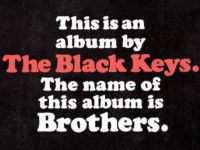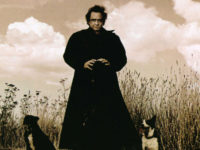by Nick DeRiso
For me, the traditional year-ending Top 10 list has a more utilitarian standard: Which albums did I add to my permanent rotation?
See, it’s the rarest of rare items that actually becomes a member of the collection. That’s the kind of standout recording we’ll be talking about today for my calendar-turning retrospective. I don’t know if they are, in fact, the best. But they’re coming with me.
If there’s a theme, looking over my list, it might be that so many of these records (notably the Black Keys, Neil Young and Black Dub) bring together two long-separated camps: Studio wizards and old-school flesh-and-blood musicians. (I’m also clearly a sucker for the third-act career resurrection — Johnny Cash, Crowded House, Buddy Guy, Prince, so on — but that’s another story.)
For years, recordings could most often be divided into those that featured a band and those who used today’s technology to craft musical amalgams — either through icy-cool synthesized excursions or in the mechanized rhythms of rap. As 2010 comes to a close, we seem to be on the cusp of a fresh synthesis. By melding the two — soul and microchip — they appear to be solidifying a new sound that can rightly be called this decade’s own.
That’s why the Black Keys heads up my Top 10 Keepers for 2010. Click through the titles for complete reviews:
THE BLACK KEYS – BROTHERS: Singer/guitarist Dan Auerbach and drummer Patrick Carney return, in many ways, to their template — the blue-eyed soul, the lo-fi atmospherics — but that doesn’t mean these well-known acolytes of the urban mid-century blues cliche have stopped hybridizing black music into modern rock. They’ve just skipped forward a few decades into the 1970s — complete with blaxploitation grooves and ghostly new Curtis Mayfield-esque vocals from Auerbach. It sparks a complete return to form inside Brothers, even while advancing the Black Keys’ core sound.
BUDDY GUY – LIVING PROOF: Easily the Lettsworth, Louisiana, native’s most consistent recording in years, and one that most resembles the liquid-fire aggression of his live performances. Buddy Guy is not disappearing quietly into any good night. In fact, if he ever goes down, this record makes clear that it’ll be swinging.
BRIAN ENO – SMALL CRAFT ON A MILK SEA: No need to decry the sad regression of a once-perpetually hip — and, when you think about it, appropriately vampiric — egghead/electro-whiz. After a brief, uncomfortable foray into standard musical structures (lyrics?!) on 2005’s Another Day on Earth, Brian Eno returns both to textured, atmospheric wierdness and to exciting rhythmic experimentation.
CROWDED HOUSE – INTRIGUER: In the wake of the 2005 suicide of drummer and co-founder Paul Hester, Crowded House could be forgiven for falling into a purpled, impressionistic sentiment. Instead, “Intriguer,” dark and tender, never stops searching for the light. Neil Finn seems to shake awake to what his goals should have been all along: “Sweet dreams, make waves, find bliss.” Absorbing, and ever more mature, Crowded House just keeps doing all of that.
BLACK DUB FEATURING DANIEL LANOIS – BLACK DUB: Densely layered, with an elegant construction, Black Dub doesn’t start out all that much differently from your average recording by uber-hip producer Daniel Lanois. Then something welcomely dangerous, almost feral, happens with the arrival of 20-something singer Trixie Whitley. Equal parts Janis Joplin and Etta James, she brings a delightfully unmannered, country realism to Black Dub. Not a perfect recording, but one of the year’s more interesting.
JOHNNY CASH – AMERICAN VI: AIN’T NO GRAVE: The American series has done nothing but gain power since its debut in the early 1990s because it provides an intricately crafted, emotionally challenging road map to taking life’s final steps. Johnny Cash, you realize right in the middle of “VI,” is ready to see June again. He is ready to die. During “It Don’t Hurt Anymore,” he sings, simply: “At last, I am free.” You expected a hard-eyed dignity from Cash, and he delivered. But also, in the end, he found — he helps us find — a bracing acceptance.
BILL KREUTZMANN, PAPA MALI, GEORGE PORTER JR. – 7 WALKERS: Together, these guys often stir up powerful memories of Kreutzmann’s old band, the Grateful Dead — from the mystical “7 Walkers,” which gave this new group its name; to “Evangeline,” where Kreutzmann does such a sensitive turn at the drums. But 7 Walkers never settle, and never settle in. Before, you know it, they’ve
risen for a Dr. John-ish Dixieland march on “New Orleans Crawl,” then lathered up some Crescent City funk with “(For the Love of) Mr. Okra.” A groove-band supergroup that delivers.
NEIL YOUNG – LE NOISE: Even after a damaging season of loss for Neil Young, there’s a lasting hopefulness here — that he can fight through loss to find a deeper appreciation for what remains, that he can better understand himself and this world, that he can still help lead the way. Young somehow never sounds quite the same from album to album. Instead, he remains, as always, restless and relentless — imbuing the modernistic, reverb-soaked “Le Noise” with a kind of anti-melancholy.
PRINCE – 20TEN: Prince sounds like his old self again. The one you used to go buy. That starts with “Compassion,” this thunderous, ass-shaking opener, in the style of every Prince album that mattered back in the day. From there, he never stops sounding like he is having fun again on “20Ten.” How long have we been waiting for that? Couple this with Prince’s curious throwback announcement that “the Internet’s completely over,” and all of sudden, we’re partying like it’s 1979.
JOHN MELLENCAMP – NO BETTER THAN THIS: A steely realism, borne out of disappointment, seems to have welled up inside of John Mellencamp. Even as he’s locked in a desperate struggle to rebuke fame’s dimming heat, Mellencamp can’t get away from every adulthood’s sharp-edged themes: “I’m sick of life, and it’s lost its fun,” he sings in “A Graceful Fall.” “I’ll see you in the next world, if there really is one.” A dark, and disturbing triumph.
- Nick DeRiso’s Best of 2015 (Rock + Pop): Death Cab for Cutie, Joe Jackson, Toto + Others - January 18, 2016
- Nick DeRiso’s Best of 2015 (Blues, Jazz + R&B): Boz Scaggs, Gavin Harrison, Alabama Shakes - January 10, 2016
- Nick DeRiso’s Best of 2015 (Reissues + Live): John Oates, Led Zeppelin, Yes, Faces + others - January 7, 2016



